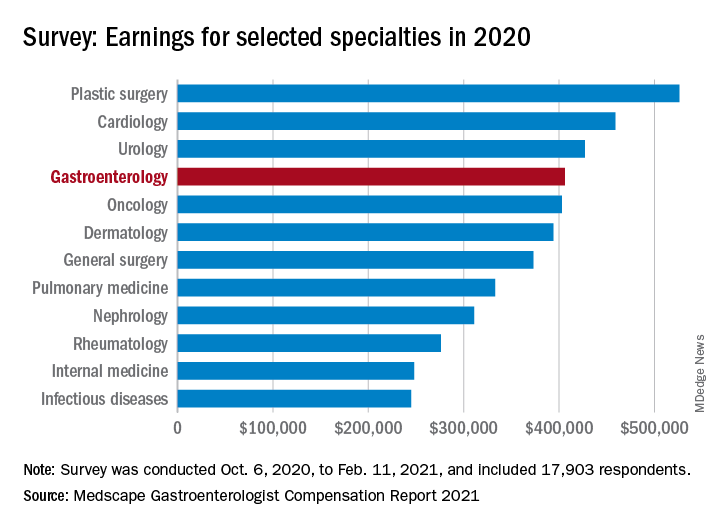Despite the shutdowns and plummeting patient volumes early in the COVID-19 pandemic, gastroenterologists’ earnings were just 3.1% lower in 2020 than in 2019, according to new survey results from Medscape.
That drop, from $419,000 to $406,000, was larger, however, than the average for all specialists, which slipped just 0.6% in 2020.
“Most gastroenterologists who saw a drop in income cited COVID-19–related issues, such as job loss, fewer hours, and fewer patients,” Keith L. Martin wrote in the 2021 Medscape Gastroenterologist Compensation Report.
Specialties with larger declines than gastroenterology included dermatology (–4%), pediatrics (–5%), and otolaryngology (–9%). Conversely, plastic surgeons saw the largest increases last year, with their average compensation rising 10% over 2019. Oncologists (+7%) and cardiologists (+5%) also did well, the Medscape data show.
For the physicians who did encounter financial hardships, relief came in several forms.
Many turned to “the federal Paycheck Protection Program to help keep themselves afloat; some were able to renegotiate their lease contracts; a large percentage reduced their staff, which reduced their expenses; and those in capitated plans were still getting paid even though they weren’t seeing as many patients,” Michael Belkin, JD, divisional vice president at Merritt Hawkins and Associates in Dallas, said in an interview.
One complication on the road to recovery was the furloughs experienced by some gastroenterologists, but work hours for the specialty have largely recovered. The prepandemic average was 53 hours per week, compared with 52 hours for this year’s gastroenterologist respondents, who represented about 2% of the 17,903 Medscape member physicians who completed the survey.
Among the gastroenterologists surveyed who did experience negative financial or practice-related effects from the pandemic, about one-third estimated that it would take 2-3 years for their income to return to the pre-COVID level, and 14% believe that it will never return to those levels. It is worth noting, however, that 45% of physicians overall reported no such harms last year.
Despite the drop in their incomes last year, more gastroenterologists said that they felt fairly compensated in 2020 than indicated as such in 2019 (55% vs. 52%). This year’s higher figure, though, is on the low end of the scale: of the 29 specialties included, only 4 were lower, and 19 were higher. Five others were the same, according to Medscape’s findings.
In other matters covered by the survey, gastroenterologists found themselves closer to the top. When asked if they would choose medicine again, 81% said yes. Only 8 of the 29 specialties were higher; 93% of gastroenterologists said they would choose gastroenterology again. Only four specialties were higher.
The survey was conducted from Oct. 6, 2020, to Feb. 11, 2021, and had a sampling error of ±0.73%. The salary figures were calculated using data for full-time physicians only.
A version of this article first appeared on Medscape.com.


